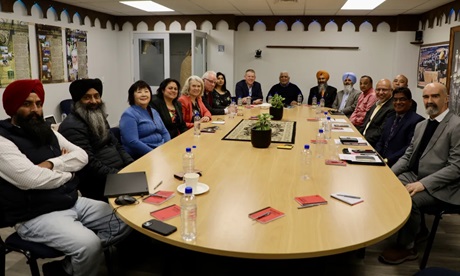Ethnic leaders in New Zealand are repeating their calls for greater participation in shaping government policy.
They have already met with Prime Minister Christopher Luxon and on 10 October met with Opposition leader Chris Hipkins and several senior members of the Labour Party.
Specific concerns
The ethnic leaders told Hipkins and his cohorts they are particularly concerned about immigration, health inequalities and crime policies.
“We had a good opportunity to discuss some of the priority immigration issues impacting our collective ethnic and faith communities” said Daljit Singh, representing the Sikh associations in New Zealand.
Another leader at the meeting said hate crimes against ethnic and faith communities had increased.
“The changes recommended by Royal Commission on 15 March have yet to be completed and this is important for all our communities” Wellington Indian Association President Manisha Morar said.
“There are significant lessons learned which have not yet been implemented, especially in the area of hate speech and hate crime.”
Data paints an ugly picture
New Zealand Police data shows that almost three-quarters of all hate crime offences reported since 2020 were motivated by race or ethnicity.
Their records show that between 1 January 2020 and 30 June, 19,589 hate-motivated offences were reported to police, with 14,285 – or 73 percent – being motivated by the victim’s race or ethnicity.
Additionally, 1563 offences were based on the victim’s sexual orientation. Another 1069 were related to religion or faith.
Possible solutions
Paul Patel of the Indian Central Association and Anwar Ghani from the Federation of Islamic Associations voiced concern over rising crime.
Community-led crime prevention efforts are needed urgently, they said.
The New Zealand Chinese Association is also concerned that ethic communities are not suitably catered for.
Richard Leung and Debbie Chen told Hipkins that health disparities negatively affect ethnic communities. Community-led solutions are crucial to address these challenges, they said.
That call was underlined by Gregory Fortuin of the African Leaders Group.
“We also need to have effective and on-going engagement to uplift our communities” Fortuin said.
Robert Hunt, chair of the New Zealand Buddhist Council, says the country’s education system should better reflect New Zealand’s ethnic diversity.
Point taken
“It was excellent to meet with representatives from our many ethnic and faith communities to discuss their priorities and the issues that we can work through alongside each other” Chris Hipkins said on social media after the meeting.
“It’s important that the voices of ethnic communities are heard and embedded into the decisions we make to take our country forward, as we prepare to be the next government.”
Source
